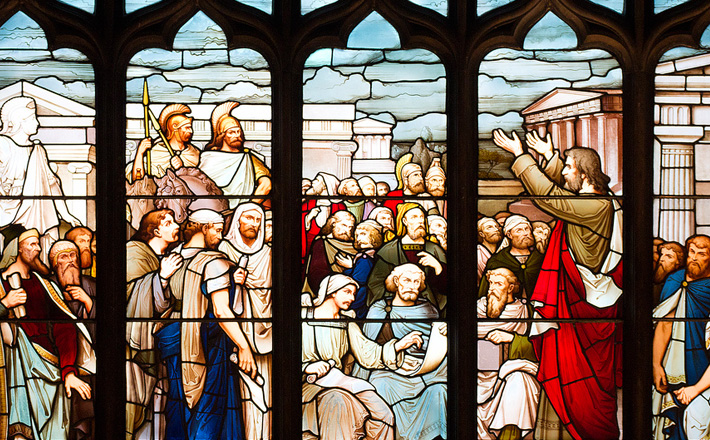Commentary on Psalm 66:8-20
Psalm 66 is a hymn of thanksgiving in which the voices of the community of faith (verses 1-12) mingle with the voice of an individual psalm singer (verses 13-20).
Verses 1-5 of the psalm echo Psalm 65’s celebration of the goodness of the creator God: “Make a joyful noise to God, all the earth … Come and see what God has done: he is awesome in his deeds among mortals (bene ’adam)” (verses 1 and 5). In verses 6-7, the psalm singers continue by celebrating the good provisions of God to Israel during the Exodus and wilderness wanderings.
In verses 8 and 9, the beginning of this week’s reading, the psalm singers continue their recounting of God’s good provisions expressed in verses 6 and 7, but in more generalized language. Verse 9 states that God has “kept us among the living” and “not let our feet slip” (see also Psalms 16:8; 17:5; 55:22). While not as direct a reference to the Exodus as we see in verses 6 and 7, these words affirm God’s continuing acts of deliverance of the faithful. They suggest, in the words of Walter Brueggemann, that “the exodus recurs again and again, in new circumstances.”1 Richard Clifford adds that “saving events of every age ‘renew’ the great saving event of the exodus.”2
The focus shifts in verses 10-12 from God’s on-going deliverance to a recollection of the testing which the faithful have undergone at the hands of God. As with the generalized language of God’s deliverance in verses 8 and 9, the trials and testings in verses 10-12 are not event specific, permitting the words to be understood in a more universal way. The word translated “people” in verse 12 (“you let people ride over our heads”) is the Hebrew word ’enosh, used in biblical Hebrew to designate the very human character (frail and flawed) of humanity.
Whether specific or universal, how do we understand words about God’s testing of the faithful? J. Clinton McCann writes, “Tests and trials need not evoke the concept of punishment; indeed, they most frequently suggest that God is examining a person for the purpose of vindicating him or her.”3 Such an understanding of these words in Psalm 66 are confirmed by the “envelope” structure around them in verses 9 and 12c: “who has kept us among the living, and not let our feet slip … you have brought us out to a spacious place.” The word translated “spacious place” in the NRSV translation is the same Hebrew word translated “overflows” in Psalm 23:5—“my cup overflows.” Thus, the “spacious place” of Psalm 66:12 is one that provides abundance after one goes through various trials and tests, just as the overflowing cup of Psalm 23 comes after the psalm singer has “walked through the darkest valley” and is “in the presence of enemies” (Psalm 23:4, 5).
Another shift occurs in verses 13-15. There, the voice of the community gives way to the voice of an individual, who states that she will come into the house of God with burnt offerings to pay the vows “that my lips uttered and my mouth promised when I was in trouble” (verse 14). While movement from plural voices to a singular one and from singular to plural is not unusual in the psalms (see Psalms 20, 103, and 123 for example), we might understand the singular voice here as that of one of the individuals whom God has delivered (verses 5-7) who is offering her own thanks to God. As with the recollections of verses 8-12, the words of verse 14 do not specify the nature of the trouble that the psalmist has undergone. Rather, they may be understood as an invitation to anyone who has experienced troubles to follow the psalm singer’s lead in making offerings of thanks to God.
In verses 16-19, the psalm singer recounts the journey she undertook in her quest for God’s deliverance. She “cried aloud” and “extolled” (highly praised) God (verse 17); and she did not cherish “iniquity” (wickedness) in her heart (verse 18). Thus, God “listened” and “gave heed to” (paid attention to) the words of her prayer. In the closing words of the psalm, the singer offers blessing to God because, she says, God “has not rejected my prayers or removed his steadfast love from me.” Again, how do we understand verse 19, where the psalm singer says that God has “given heed” to the words of her prayer? Are the singer’s prayers answered only because she has offered the proper burnt offerings? James L. Mays writes, “The offerings are presented to keep the promises made in prayers for help in times of trouble. They are not to be thought of as ways to pay God back but rather as ritual acts of acknowledgement and confession.”4 The psalm concludes in verse 20 with an affirmation of God’s care for the psalm singer—God has not rejected her prayer or removed God’s steadfast love (hesed) from her.
The superscription of Psalm 66 in the Septuagint and the Vulgate is: “To the end (for example, forever), a song, a psalm of resurrection.” The creator God, who delivered the Israelites from Egypt, continues to deliver the faithful in recurring exoduses in new life situations, giving new life to those delivered.
Notes:
Walter Brueggemann, The Message of the Psalms: A Theological Commentary (Minneapolis: Augsburg, 1984), 138.
Richard J. Clifford, Psalms 1-72, Abingdon Old Testament Commentaries (Nashville: Abingdon, 2002), 310.
J. Clinton McCann, Jr., “The Book of Psalms,” in The New Interpreters’ Bible Commentary, vol. III, ed. Leander E. Keck (Nashville: Abingdon, 2015), 485.
James L. Mays, Psalms, Interpretation: A Bible Commentary for Teaching and Preaching (Louisville: John Knox Press, 1994), 223.


May 17, 2020